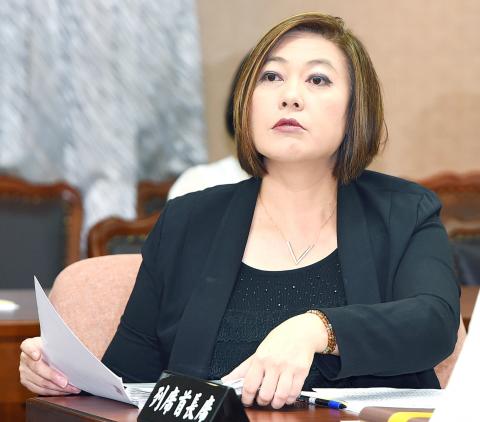Much-anticipated draft amendments to the three main media laws could be announced next month or in November, the National Communications Commission (NCC) said yesterday, adding that they would address problems caused by rules barring the government, political parties and the military from investing in media outlets.
NCC Chairperson Nicole Chan (詹婷怡) told a question-and-answer session at the Legislative Yuan in Taipei that the regulations barring investments from political parties, the government and the military are difficult to enforce.
The commission established a taskforce to review the three laws — the Radio and Television Act (廣播電視法), Satellite Broadcasting Act (衛星廣播電視法) and Cable Radio and Television Act (有線廣播電視法), she said.

Photo: Liao Chen-huei, Taipei Times
The commission is considering allowing investments by the three, but their shareholdings would likely be capped at a certain percentage, and neither politicians nor government or military officials would be allowed to control media companies, she said.
Commission members and lawmakers on the legislature’s Transportation Committee had previously deliberated over the exact percentage, ranging from 5 to 10 percent, Chan said.
Democratic Progressive Party (DPP) legislators Cheng Pao-ching (鄭寶清) and Lin Chun-hsien (林俊憲) and People First Party Legislator Lee Hung-chun (李鴻鈞) yesterday urged the commission to quickly amend the regulations.
Cheng and Lin mentioned the dispute in July involving Chunghwa Telecom’s Multimedia-on-Demand system.
The telecom, in which the government holds a 38.43 percent stake, is banned from owning channels that provide content, Cheng said.
When it tried to change the mechanism for dividing the content authorization fee among different channels, some channel operators opposed the move, which led to the disputes, but this could have been avoided if it were allowed to become a content provider and to own channels, he said.
Taiwan Optical Platform’s proposed acquisition of Eastern TV failed after its competitor asked a politician to buy just one Taiwan Optical Platform share, he said.
Another example was Momo Kids TV’s license renewal case, which received conditional approval to on Wednesday after the channel was told to divest itself — within three years — of the 15 percent of shares that are indirectly owned by the Taipei City Government and Labor Pension Fund, he said.
Cheng proposed that political parties, the government or the military be allowed to invest in media outlets as “special shareholders,” but be barred from controlling the companies or holding seats on their boards.
Lee said that media outlets cannot produce quality programs without sufficient advertising revenue, so discussions about amending the three laws should not be focused on limiting the market share or ownership rules.
“The purpose of ban [on the three sectors’ investing] was to avoid having media outlets used to champion the agendas of certain political parties. Yet when you look at cable news channels now, which of them can honestly say they do not represent the values of a certain political camp?” Lee said. “At present, news channels are only interested in producing content targeting their niche markets to ensure steady advertising revenue.”

ANOTHER EMERGES: The CWA yesterday said this year’s fourth storm of the typhoon season had formed in the South China Sea, but was not expected to affect Taiwan Tropical Storm Gaemi has intensified slightly as it heads toward Taiwan, where it is expected to affect the country in the coming days, the Central Weather Administration (CWA) said yesterday. As of 8am yesterday, the 120km-radius storm was 800km southeast of Oluanpi (鵝鑾鼻), Taiwan’s southernmost tip, moving at 9kph northwest, the agency said. A sea warning for Gaemi could be issued tonight at the earliest, it said, adding that the storm is projected to be closest to Taiwan on Wednesday or Thursday. Gaemi’s potential effect on Taiwan remains unclear, as that would depend on its direction, radius and intensity, forecasters said. Former Weather Forecast

As COVID-19 cases in Japan have been increasing for 10 consecutive weeks, people should get vaccinated before visiting the nation, the Centers for Disease Control (CDC) said. The centers reported 773 hospitalizations and 124 deaths related to COVID-19 in Taiwan last week. CDC Epidemic Intelligence Center Director Guo Hung-wei (郭宏偉) on Tuesday said the number of weekly COVID-19 cases reported in Japan has been increasing since mid-May and surpassed 55,000 cases from July 8 to July 14. The average number of COVID-19 patients at Japan’s healthcare facilities that week was also 1.39 times that of the week before and KP.3 is the dominant

The Chinese Communist Party’s (CCP) working group for Taiwan-related policies is likely to be upgraded to a committee-level body, a report commissioned by the Mainland Affairs Council (MAC) said. As Chinese President Xi Jinping (習近平) is increasingly likely to upgrade the CCP’s Central Leading Group for Taiwan Affairs, Taiwanese authorities should prepare by researching Xi and the CCP, the report said. At the third plenary session of the 20th Central Committee of the CCP, which ended on Thursday last week, the party set a target of 2029 for the completion of some tasks, meaning that Xi is likely preparing to

US-CHINA TRADE DISPUTE: Despite Beijing’s offer of preferential treatment, the lure of China has dimmed as Taiwanese and international investors move out Japan and the US have become the favored destinations for Taiwanese graduates as China’s attraction has waned over the years, the Ministry of Labor said. According to the ministry’s latest income and employment advisory published this month, 3,215 Taiwanese university graduates from the class of 2020 went to Japan, surpassing for the first time the 2,881 graduates who went to China. A total of 2,300 graduates from the class of 2021 went to the US, compared with the 2,262 who went to China, the document showed. The trend continued for the class of 2023, of whom 1,460 went to Japan, 1,334 went to